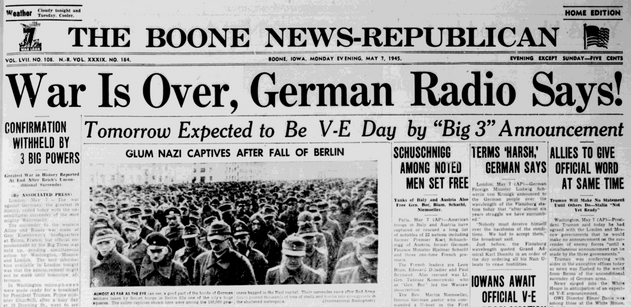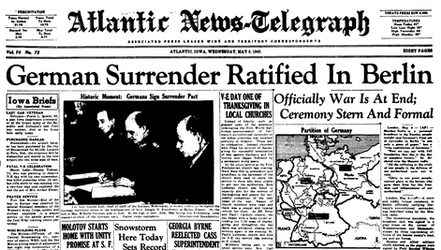Victory in Europe—Part Two
- Sally Jameson Bond

- May 11, 2022
- 7 min read

V-E Day was certainly celebrated in the United States, but perhaps “commemorated” is more appropriate in some respects. New York City hosted the largest V-E Day celebration in the country, as huge crowds gathered in Times Square, and confetti fell upon thousands and thousands who marched down Fifth Avenue. Several days earlier, an article in the New York Times informed its readers that over 15,000 police officers would be on duty after the surrender was announced “to ensure that celebrants are held within the bonds of sane and reasonable hilarity.” I’m confident the people of New York City were reassured.
While other victory parades were held in San Francisco, Baltimore, and Honolulu, a number of cities chose to observe V-E Day more reverently, if at all. In Chicago, special church services were held, and liquor stores remained closed for twenty-four hours. Most employees remained on the job throughout the day. For the most part, New Orleans saw no celebrations at all, and the citizens of Dallas, Denver, Atlanta, and Boston remained calm. On May 8th, the mayor of Los Angeles, Fletcher Bowron, proclaimed: “This is not a holiday.”
Of course, Americans were certainly relieved the war with Germany was over, but they also knew the war with Japan continued with fierceness in the Pacific. The longed-for celebrations across the U.S. would be delayed for another three months.
V-E Day in Iowa
On May 8, 1945, most Iowa communities also chose to remain calm. The Ames Daily Tribune told its readers “No Hilarity in Ames on V-E Day.” In the Atlantic News-Telegraph, readers learned “V-E Day One of Thanksgiving in Local Churches.” (Another frontpage article in that issue: “Snowstorm Here Today Sets Record.” Atlantic, located between Omaha and Des Moines, got a couple of inches, and the temperature dipped to 32 that night. Wow!) A photo on the front page of the May 7th edition of the Boone News-Republican had this headline: “Glum Nazi Captives After Fall of Berlin.” In Carroll, everyone took the news of Germany’s surrender in stride, with no big public demonstrations. The fire sirens in Mount Pleasant were to sound “at length” when the official announcement was made. And, in an article in The Muscatine Journal, readers learned that Iowa’s governor, Robert D. Blue, “urged every man and woman in Iowa engaged in essential war work to continue at their task to the end, that no son or daughter, no husband or father, shall lose their lives in the south Pacific because of any neglect of ours.”

At the University of Iowa (my alma mater) in Iowa City, a large crowd of faculty, students, and townspeople gathered on May 8th in the Iowa Memorial Union (IMU) Main Lounge, a space I know quite well. (More on that in a minute.) Participants in the afternoon service included Department of Music Professors Harold Stark and Philip Greeley Clapp, Professor Earl E. Harper, and SUI President Virgil M. Hancher. (I know those names will be familiar to some of you.)

(Caption: Ruth Ostrander, A2 of Marion, soloist with the university band, is shown as she played taps during yesterday’s V-E day program.)
This photo was included in The Daily Iowan article about the service. When I saw it, I knew I had found a way to blog about my experiences in the IMU Main Lounge in the 1960s and early 1970s. Bear with me—this has (almost) nothing to do with World War II.
For four summers, from 1966 to 1969, I was privileged to attend the University of Iowa All State Music Camp (ASMC). I was just fourteen years old the first time I got to live for two weeks in a women’s dormitory (Courier Hall) on the U of I campus. What a sense of freedom! I met some amazing people and learned so much each summer. To this day, I consider those weeks at ASMC some of the greatest experiences—not only musical—of my entire life.
Our concerts (there were two each summer) were held in the IMU Main Lounge. My parents (and probably younger siblings—my older sister Julie was also a camper my first two years) drove up from Ottumwa for the first concert on Sunday afternoon and again the following Friday, the final night of camp. There were always tears (from the girls, anyway) when we said our goodbyes.
During my junior and senior years in high school, I was also a member of the U of I Honor Band, and yes, our concerts were held in the IMU Main Lounge. Frederick Fennell, the internationally recognized conductor and educator who founded the Eastman Wind Ensemble in 1952, conducted the Honor Band both years. (During World War II, Fennell served as National Musical Advisor for the USO. There’s the WWII connection!)
While a freshman at Iowa (1970-1971—I was a music ed major), our band concerts were held in the IMU Main Lounge while the new (later Voxman) music building, Clapp Recital Hall, and Hancher Auditorium were under construction across the Iowa River. If memory serves, our band concerts were held in Clapp in the fall of 1971 and beyond. No more band concerts in the IMU Main Lounge.

May 8, 1945 was a relatively quiet day in Ottumwa (except for the siren blasting away from the rear of the city hall building and the aerial bombs exploding in the municipal parking lot on South Market Street). A week earlier, on page eleven of the April 30th edition of the Ottumwa Daily Courier, citizens were informed that V-E Day would be celebrated “joyfully, yet with the understanding that the war isn’t over, that many American boys must still die before Japan is brought to its knees.”
Planning for the V-E Day celebration in Ottumwa was complicated by the unknown. Here’s what the city fathers ultimately decided.
(1) If the news of the victory is received at night, stores will be closed all the next day.
(2) If the news comes in the morning before 12 o’clock noon, the stores will be closed the rest of the day.
(3) If the news breaks in the afternoon after 12 o’clock, the stores will be closed then and remain closed the next day.
(4) If the news breaks on Sunday or a holiday, the stores will remain closed all the next day.
(5) If the news breaks on a Saturday night before midnight, the stores are to open as usual Monday morning.
(6) The schedule is not to apply to food stores and restaurants handling perishable items, it was explained. These are to make their own rules.
I found these two photos in the May 9th edition of the Courier. “Ottumwa’s observance of victory-in-Europe day Tuesday was done in a solemn manner. There were no surging crowds and general confusion. Instead, there were church services and a community-wide program of thanksgiving.” The program in the Ottumwa Coliseum (held there instead of Central Park, apparently due to inclement weather) was attended by 1,300 people, and one of the participating clergy members was Rev. Malvin Lundeen, pastor of First Lutheran Church in Ottumwa. (Seven years after that event, I was baptized by Pastor Lundeen.)

As you might expect, I write about V-E Day in My Mother’s Friend. I’ll close with an excerpt from Chapter 32. It’s May 7, 1945, and high school senior Phee Swensson is on her way home from school. While everyone around her is joyous about the impending news of Germany’s surrender, Phee is a wreck, understanding the “good news” means her friend Horst, a German POW, will be leaving Camp Algona in the next weeks or months.
Anticipation swirled around Algona this morning. Adolf Hitler was dead; the end of the war in Europe was inevitable; and everyone within earshot of a radio was listening and waiting for the news. Surely it would come today.
And it did, except it wasn’t official. Radio reports indicated that the word from Washington, DC would be forthcoming, but it didn’t come. Nevertheless, the mayor and the Algona Retail Closing Uniformity Committee members met at the Chamber of Commerce and proceeded with the celebration. The siren at City Hall sounded at ten fifteen and continued blasting away for fifteen minutes. Hearing the signal for all businesses and schools to close, people rushed home or gathered in small groups downtown. Some school kids celebrated their early dismissal by riding their bikes up and down the streets, waving to passersby, giggling and shouting, “the war’s over! the war’s over!” There were big smiles on every face in town—or almost every face.
The twins and Mollie arrived home before Phee. She’d stayed at school to talk to Mrs. Goodwin about the program scheduled for one thirty in the high school auditorium. The mixed chorus and the band would perform, Mayor Kimball would speak, and Frank was asked to give the opening prayer and benediction. Tonight, most churches in town, including St. Pete’s, would offer a short service of gratitude and remembrance.
Phee wasn’t anxious to face her family, so she walked her bike home from school, occasionally waving to friends and acquaintances and even perfect strangers who shouted out or waved to her along the way. She was envious of those who were smiling and laughing, those who were overjoyed about the end of the war with Germany. Lucky you.
She leaned her bike against the house, then came around to the front door, heaving a big sigh before walking in. Mollie, who’d been watching from the living room window, ran to the door and gave her sister a hug. “Oh, Phee, it’s wonderful! The war’s over! Can’t Jamie come home now?”
Phee forced a happy reply. “Well, the war in Europe seems to be over. And yes, I certainly hope Jamie can come home.”
Frank walked out from the kitchen. “Glad you’re home. Is everything alright?”
“Yeh, I stayed to talk to Mrs. Goodwin about the program.”
“It seems the city fathers have jumped the gun. There’s still no official announcement from Washington about the surrender.”
“I’m sure the mayor’s been planning this for weeks. Everyone is more than ready.”
“Indeed, they are,” he said. “Say, I’m planning a short service for tonight. Edith’s a little under the weather so I need you to play. She said to tell you no lesson today.”
Phee sat on the chair next to the phone, covered her face with her hands, but said nothing.
“What’s going on?” Frank asked.
“Oh, nothing, really,” she said with a sigh, “it’s all just a little overwhelming.”
“I know. It’s hard to believe it’s really happening. So, what about tonight?”
“I can do it. Just let me know what I need to know.”
“I’ll give you the hymn numbers. Will that suffice?”
“Sure. Better get upstairs and look at my homework. Can you get lunch going?”
“I think I can manage.”
When Phee got to her bedroom, she gently closed the door, laid her books on the bed, walked to her closet, and stepped inside. Her bathrobe hung from a hook on the door. Burying her face in one of the sleeves, she cried her eyes out. When she was done crying, she had a thought: I need to see Horst!
And she did.

May 8, 1945 was my father-in-law’s 38th birthday. I bet there was quite a celebration on the farm that day. Happy Birthday, Dad!
Blessings to all.
Sally Jameson Bond is retired and lives in Southwest Virginia with her husband and two dogs. My Mother’s Friend is her (as yet unpublished) debut novel. You can find her web site here: www.sallyjamesonbond.com.





























Thank you, Sally. You have reminded me of what I missed by being born in 1951. But, having said that, you have also given me a chance for my eyes to well up with tears of joy. What a day that was!